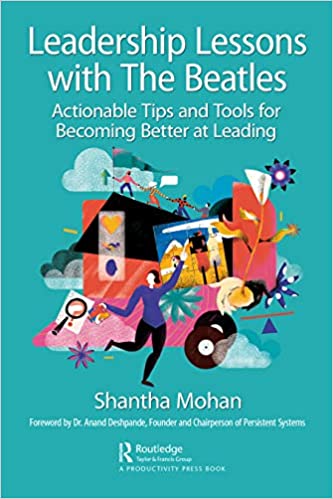
In my role as managing editor of Leader to Leader, I recently had the privilege of editing the article “The Hidden Powers of Vulnerability and Humility,” by Shantha Mohan. It’s adapted from her just-published book Leadership Lessons with The Beatles: Actionable Tips and Tools for Becoming Better at Leading.
Shantha lives a truly multidimensional life, as an engineer who became a global software leader and author. She is a mentor and project guide at the Integrated Innovation Institute, Carnegie Mellon University, and her two previous books are Roots and Wings – Inspiring stories of Indian Women in Engineering, and as co-author; Demystifying AI for The Enterprise – A Playbook for Business Value and Digital Transformation. For this post, I asked her about the new book, and various aspects of her life and career, in particular how everything fits together and has evolved over the years.
1. You have an extensive background in education and mentoring. How do these areas continue to inform your life on a day-to-day basis, and what role, if any, did they play in the research, planning, and writing of your new book?
Mentoring is a big part of my days. I mentor through several venues, such as the classes I co-teach at Carnegie Mellon University (CMU), the Society of Women Engineers (SWE) mentorship program, and the Barbara Smith Women’s Mentoring Program run by the CMU Women’s Association. I mentor the undergraduate students at my alma mater in India and the entrepreneurs who reach out to me on social media to get my take on their ventures in retail, my recent domain of expertise because of the company I co-founded in it. In each mentoring engagement, the mentees’ needs range from higher studies, career choices and transitions, innovation and entrepreneurship, and in some cases, life decisions.
Every time I mentor someone, I am highly aware of how my mentees made themselves vulnerable to approach me, which makes me strive to do the best for them. On the flip side, every mentee enriches my knowledge and expands my views, and I learn from their vulnerability to have the courage to be vulnerable myself. I asked my friends for help in reviewing the first drafts of the book. I reached out to thought leaders to request their endorsements.
When writing the book, I thought quite a bit about my audience as an educator. I wanted the book to impact those who are just starting their leadership journey—those on the first rung of the ladder where they are now responsible for a team. As a mentor, I thought about how the book could be a mentor for someone who is having a hard time finding a mentor. I took to heart this quote by Socrates, “Employ your time in improving yourself by other men’s writings so that you shall come easily by what others have labored hard for.”
2. Your technology and business backgrounds are also quite extensive. Based on the material in your book, or elsewhere, what commonalities between these fields do you see with the arts as a whole, not just music, especially as we move into a seemingly technology/AI-dominated future?
An essential aspect of any field is innovation. It keeps the area alive and thriving. Whether you are creating a new technical product or service or creating a new piece of music or painting, the creative process of innovating is common to all fields. To be an innovator, you need to think for yourself. You have to understand the norms, but be prepared to go against them.
You have to be ready to travel the long and winding road because you will encounter many roadblocks and failures. It requires tenacity. And the pillars that build a tenacious individual— passion, audacity, grit, resilience, and flexibility—are must-have attributes for excellence irrespective of the field.
You have to be ready to collaborate with others who could bring complementary skills to the table. That is possible only if you set your ego aside and work towards a common goal, which is as relevant for a start-up as it is for a fledgling band.
I am very hopeful that technology/AI will not dominate humans. I like to believe that the “A” in AI is Augmenting, not Artificial.
3. There continues to be a steady outpouring of books, videos, movies, and so on about or related to The Beatles. But do you find that people in young age groups worldwide have a strong awareness of and interest in The Beatles, not only in terms of their music, but their continued importance as a worldwide cultural phenomenon?
I do. My grandchildren are good examples. They not only know The Beatles but music from back in the 1960s to now because their parents expose them to music from different periods and different genres from other parts of the world. A CNBC article from 2019 said The Beatles’ music was streamed 1.7 billion times as of October that year. Apparently, those between the ages of 18 and 24 contributed 30% of that, and 17% contribution came from those who were between 25 to 29. At this point, I would say they have attained the status of music classics. They have been around us for so long, and they are now a part of the fabric of our life. In terms of their continued importance as a worldwide cultural phenomenon, I see many professors offering classes on The Beatles. One of the endorsers of my book, The Beatles scholar Prof. Kenneth Womack, teaches the course Introducing the Beatles! at Monmouth University in New Jersey. At my alma mater, Carnegie Mellon University, we have a class taught by Prof. Stephen Schultz every fall semester. He told me that the students have Beatles songs on all their playlists by the end of the semester and are driving their friends crazy! In Liverpool, UK, The Beatles’ birthplace, the monuments to the Beatles will keep their presence fresh for many generations to come.
